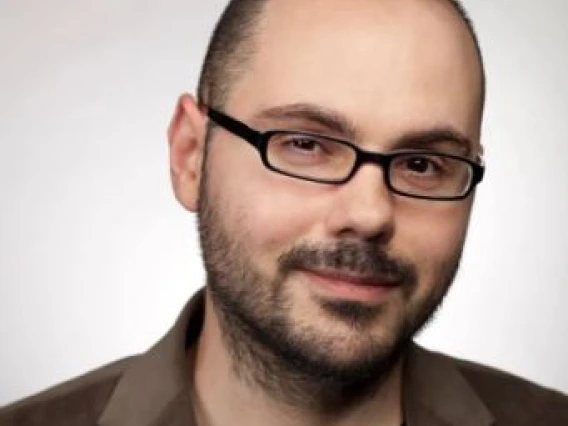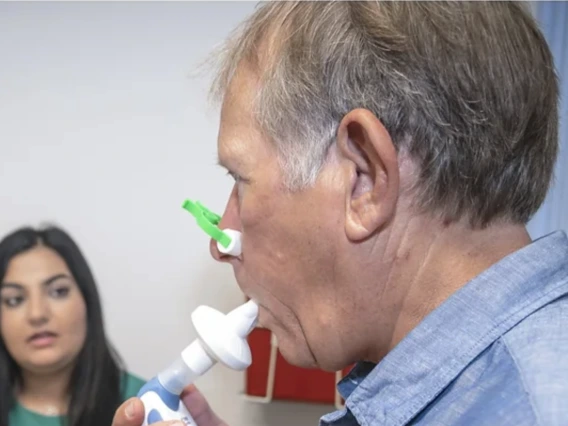
Sairam Parthasarathy, MD
Dr. Parthasarathy has expertise in non-invasive home ventilation for sleep-related breathing disorders and invasive ventilation in critically ill patients. His major areas of focus have been in promoting adherence to non-invasive ventilation devices, including continuous positive airway pressure (CPAP) devices, in the home setting and patient-ventilator interaction during critical illness. He serves as chief of the Division of Pulmonary, Allergy, Critical Care & Sleep Medicine at the University of Arizona College of Medicine – Tucson, founding director of the UArizona Center for Sleep & Circadian Sciences, medical director of the Center for Sleep Disorders at Banner – University Medical Center Tucson, and as a special advisor to the National Institutes of Health and National Heart, Lung, and Blood Institute.

Michael Grandner, PhD, MTR, CBSM, FAASM
Dr. Grandner's research focuses on how sleep and sleep-related behaviors are related to cardiovascular disease, diabetes, obesity, neurocognitive functioning, mental health, and longevity. Current and recently-completed research projects were funded by the National Institute on Minority Health and Health Disparities (NIMHD), the National Institute on Drug Abuse (NIDA), the National Heart, Lung, and Blood Institute (NHLBI), National Institute for Environmental Health Sciences (NIEHS), American Heart Association (AHA), National Collegiate Athletics Association (NCAA), and other organizations. Read more about his research or select publications.

Daniel J. Taylor, PhD, CBSM, ABSM
Dr. Taylor's research interests include epidemiology and treatment of comorbid insomnia as well as military, health care and first responder sleep disorders.
The Insomnia and Sleep Health Research Laboratory was created upon his arrival at the University of Arizona in 2019. Current research focuses primarily on three main tracts: 1) Insomnia, 2) Sleep Health, and 3) Military Sleep Medicine. Dr. Taylor is a principal investigator or co-investigator on federal research grants investigating insomnia and other sleep disorders as risk factors for the development or maintenance of comorbid disorders (e.g., infection, PTSD, cardiovascular disease, suicide) as well as the efficacy and effectiveness of cognitive behavioral therapy of insomnia in patients with comorbid disorders (e.g., PTSD, depression, fibromyalgia, Autism) in both civilians and military personnel.

Fabian-Xosé Fernandez, PhD
Dr. Fernandez's research interests include, establishing the logic used by the circadian pacemaker to interpret multidimensional light patterns, understanding the psychology associated with nighttime wakefulness and its role in suicide risk, identifying and understanding the significance of circadian fluctuations in real-world data and analysis of important topics in sleep and circadian science.

William D. "Scott" Killgore, PhD
Dr. Killgore is the Director of the Social, Cognitive, and Affective Neuroscience (SCAN) Lab in the Department of Psychiatry at the University of Arizona College of Medicine. His research focuses on understanding the brain systems involved in emotional processes and cognitive performance. For the past two decades, his work has focused nearly exclusively on the factors affecting the mental health, wellbeing, and performance of military personnel. His work combines neurocognitive assessment with state-of-the-art neuroimaging methods to study the role of emotion in complex cognitive processes such as moral judgment, decision-making, and risk-taking. His work also focuses on how these brain-behavior systems may be affected by environmental and lifestyle factors such as insufficient sleep, nutrition, light exposure, physical activity, and the use of stimulants such as caffeine. In particular, Dr. Killgore has explored the role of sleep as a primary foundation psychological and emotional health and the potential role of insufficient sleep as a contributor to psychiatric disturbance, emotional dysregulation, risk-related behavior, and performance. He is currently conducting several Department of Defense funded studies aimed at improving sleep and resilience in military personnel. In particular, current studies focus on neuroimaging studies to understand the effects of sleep deprivation on the brain, pioneering the integration of virtual reality (VR) and artificial intelligence (AI) to advance the diagnosis and assessment of traumatic brain injuries (TBIs) among military personnel, developing statistical models of the stress response, enhancing resilience and emotional intelligence, and improving sleep, emotional functioning, and cognitive performance through various interventions such as targeted light exposure, caffeine, and neuromodulation with transcranial magnetic stimulation.

Patricia Haynes, PhD
Dr. Haynes’ research employs a chronobiological framework to the study of stress in chronic health conditions like obesity, depression, and stress-related disorders. She conducts studies that investigate the disruption of sleep and social rhythms after stressful life events. She also studies how sleep interventions may be adapted to increase effectiveness and uptake in at-risk populations.
Dr. Haynes has led research projects funded by the National Institutes of Health (NHLBI, NIMH), U.S. Department of Defense, American Sleep Medicine Foundation, Arizona Institute for Mental Health Research, and Zuckerman Family Center for Prevention and Health Promotion at the University of Arizona Mel and Enid Zuckerman College of Public Health.
Dr. Haynes is committed to the translation of research findings to clinical practice. She is a licensed clinical psychologist with a diplomate certification in behavioral sleep medicine. She has more than 20 years experience providing evidence-based intervention to patients in multiple settings including the VA, academic healthcare, and municipal workplace settings. Therapeutic modalities include: CBT, DBT, ACT, and MI. She also provides Cognitive Behavioral Social Rhythm Therapy, a group intervention her team developed and tested to reduce mental health symptoms and promote resiliency to stress.

E. Fiona Bailey, PhD
The Bailey laboratory studies the neural regulation of upper airway muscle activities and specifically, the role of chemical and pulmonary afferent feedback and selective electrical stimulation to alter airway geometry and volume in human subjects. A parallel line of enquiry focuses on OSA adults and the respiratory regulation of vascular health secondary to changes in endothelial function and/or sympathetic transduction.

Lauren Hartstein, PhD
The University of Arizona Sleep and Development Lab studies environmental and behavioral factors affecting sleep and circadian health in children and adolescents, including light exposure, screen media use, and melatonin supplements.
We utilize measures of behavior (actigraphy, cognitive tests, sleep and media diaries) and physiology (salivary melatonin, pupillometry) to answer fundamental questions about children’s circadian physiology, as well as to develop and test interventions to improve young children’s sleep and circadian health.

